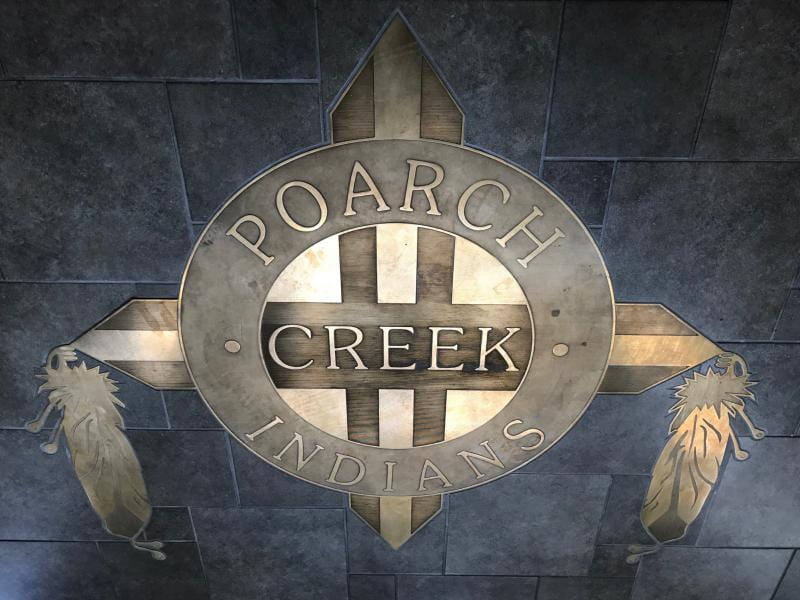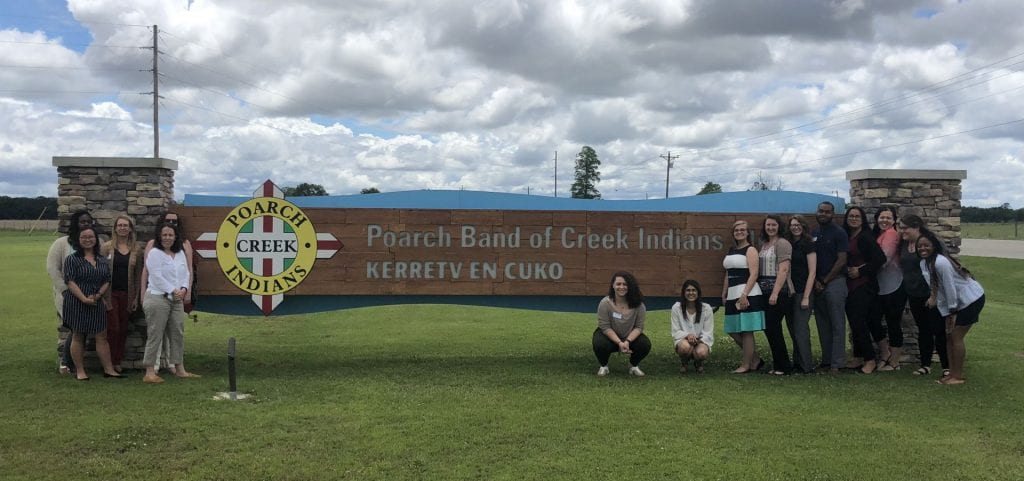The UAB Public Health Trailblazers headed to Atmore, AL after a restful but educational weekend. Our class includes students with heritage from most continents, and even some with Indigenous American heritage, but none who grew up in a tribal cultural setting. We were all outsiders as we entered the Poarch Creek Band of Indians. We were there to visit the new tribal health department and health center and to meet with Sandra Day, the Director of Community Health.
Since our readers, like all of the student Trailblazers, probably would benefit from a brief background of this tribe’s history:
It is well established that the European settlement of North America led to various forms of systemic oppression, relocation, and genocide to the indigenous people that were here. In 1830, the Indian Removal Act forcibly relocated southeastern tribes to federally owned land west of the Mississippi River. The Poarch Band of Creek Indians circumvented this relocation and continued to reside in south Alabama, mainly in Escambia County. They became a federally recognized Tribe in 1985. Although the acceptance of tribes across the United States has improved, the negative impacts of long term oppression still resound within tribal communities. As much as we’d like to think of this discrimination as ancient history, we must face the harsh realities of what happened not so long ago so that we can work towards genuine equity.
Native Americans experience higher rates of chronic liver and respiratory diseases, assault and homicide, self-harm and suicide, and alcohol and drug abuse when compared to white communities. The Poarch Band of Creek Indians Tribal Health Department is working to decrease these health disparities through access to services, health education, and several specific grant programs.
One such grant is the Good Health and Wellness project sponsored by the United South & Eastern Tribes (USET) and the Centers for Disease Control and Prevention (CDC). Mrs. Wynell Bell, the grant manager, detailed some of the programs they have implemented to address diabetes, obesity, and hypertension – the top three health indicators affecting their tribe. Incentives encourage the use of a monthly farmers market on the reservation. Wellness Wednesday is an event for the whole community, young, old, and in between, to survey individuals’ health and engage elders in physical activity. “They value their youth, and they value their elders,” Day told us. This event brings both together in a fun interactive event to pursue better health. As a reward for participating, vouchers for the farmer’s market (another result of this grant) are handed out to attendees.
Despite the efforts of the Poarch Creek Health Department, the tribe faces numerous barriers to improving their health. After a history of discrimination, distrust for nontribal members resonates throughout. To this day, the reservation remains a food desert. After elevated disease rates lower life expectancies, tribal members accept fatalistic perspectives toward health. The history of the Poarch Band of Creek Indians has shaped their health outcomes, but the devoted employees at the tribal health department remain optimistic. Programs that rely on grant funding are hard to sustain once the funding dries up. According to Bell, “this does not deter them from providing evidence-based programs and services that will work to improve health outcomes over time”.
It was very apparent from our visit that this community is completely family-oriented. We could feel it. And as we departed, we were left asking ourselves how can we reach out to help a community with a history of distrust of outsiders? How can we encourage young tribal members to seek training in medicine and public health and return to the reservation in order to improve health in their community? These and many other questions weren’t answered in a day. We won’t find a one-size-fits-all solution. Nor can we work in isolation; it will take a collaborative approach from many people from different sectors to provide comprehensive solutions. For the Poarch Band of Creek Indians, improved health outcomes can be achieved by programs that involve the whole family and partner with other organizations to seek common goals. With every stop, we gain a deeper understanding of how essential collaboration, trust, and community-focus are for achieving greater health equity.
Team 1 – C3 – Catherine, Claire, & Courtney


